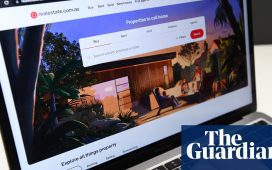Dimitri Chrisis decided to ditch his real estate agent halfway through the campaign to sell his three-bedroom house in Marrickville in Sydney’s inner west.
“I had the property on the market, they had quoted me a price prior to signing the agency agreement, and then two weeks in he rings me and says you need to reconsider your expectations.
“He wanted me to drop my pants half a million dollars – that put a sour taste in my mouth.”
Chrisis is now selling his property privately, but from the outset he realised he was being put at a disadvantage by the dominant property portal realestate.com.au.
The website does not allow private sellers to advertise directly – instead, these vendors have to use a registered private sales agent who advertises on their behalf.
The cost to list his house on the site through a real estate agency was $3,200 for a premiere listing, but to sell privately using a private sales agent the cost was $6,200.
“It is shocking – how can they be charging people [who want to buy a one-off premiere listing] double the price? It is very unfair.”
Australian consumers are paying the most expensive advertising fees in the world to sell their homes online as a result of the market dominance of realestate.com.au and its smaller competitor, Domain.
Given its market-leading reach, realestate.com.au has become almost obligatory for consumers advertising their homes for sale online. But industry sources say prices for a premium listing have increased up to 50-fold over the past 15 years, delivering massive profits to its listed parent company REA Group, which is majority owned by News Corp.
In most other markets, the cost of advertising a property is negligible and usually covered by the agent’s selling fee.
In the US, most home sellers do not pay to advertise their properties, with agents uploading listings to geographically based industry-owned databases called a Multiple Listing Service (MLS), which are then accessed by consumer-facing search portals.
In the UK, agents cover the cost of advertising fees from commission fees, with the dominant databases costing an agent about £1,400 (A$2,750) a month for all of its listings.
But in Australia if you are using an agency, the cost of advertising a property in metropolitan Sydney and Melbourne is now up to $4,000 for a single premiere listing on realestate.com.au, with a similar advertising fee for Domain. These costs are passed on to the vendor in most areas.
Both websites charge a different amount depending on the location, varying by state and by suburb.
A spokesperson for REA Group said the website’s pricing varied “depending on the products our customers choose and the region they operate in”.
“Our pricing structure reflects our focus on investment in new products, services and features which support the consumer experience and drive consumer engagement. Our focus is on delivering customers and vendors the greatest return on their investment.”
She said a customer – in reference to a real estate agent – could choose a less expensive advertisement, suggesting an ad could be as low as $200 in a suburb such as Surry Hills in Sydney.
However, many agents are locked into the higher-priced contracts, meaning the house seller is not given an option.
‘They are just printing money’
Mike DelPrete, a US-based real estate technology strategist, said Australia was one of only around three markets globally – along with New Zealand and Sweden – where the home seller footed the bill for advertising a property.
DelPrete said REA Group, which owns realestate.com.au, was seen as a global leader in the portal industry and boasted the highest profits.
“REA is the best in the world at this. REA is the most profitable real estate portal in the world … and organisations in every country around the world look to them for best practice – they are masters at this.
“They are just printing money.”
DelPrete, who is also a scholar-in-residence at the University of Colorado in Boulder, said the company had derived more than 86% of its revenue growth from so-called “depth” revenue since 2017. Depth revenue is that which comes from consumers paying for more expensive advertising products.
This accounted for $403m extra coming from their listing revenues from consumers in the period 2017 to 2023.
“They have incredible power, they benefit from network effects which is the same thing that has benefited social [media] networks, they are very monopolistic in behaviour, they are hard to disrupt and they can fundamentally charge whatever they want, and they do keep charging whatever they want.
“They are goldmines, absolute goldmines, because you can raise prices everywhere, and agents may pay a little bit more, but if the vendors are paying for it, you can charge whatever you want.”
Andrew Blachut, the owner of PropertyNow, which offers a private selling model for the residential property market, said attempts to disrupt the industry had been thwarted by realestate.com.au’s dominance.
“Why is it so hard to disrupt real estate in Australia? I will give you the single biggest reason right now: realestate.com.au,” Blachut said.
“The single most powerful element controlling Australian real estate is realestate.com.au; it is a $27bn company, it’s majority owned by News [Corp], so now you have Australia’s largest media group controlling Australia’s largest real estate website, which controls Australia’s largest industry.
“No one else has more power to influence how Australians buy and sell property than realestate.com.au.”
Blachut said the pricing structure and policies of realestate.com.au effectively penalised the model that cut out agent fees.
For example, Blachut said his organisation could not afford to opt in to a “premiere all” package as most sellers who did not use an agent did not want to spend thousands of dollars on advertising fees. This was despite his organisation having more listings on the site than most agencies.
However, if someone did want to upgrade and pay for a premiere listing, the price would be more than double that paid by an agency on a subscription package – as Chrisis had experienced.
“Whether by design or by choice, realestate.com.au massively disadvantages companies like PropertyNow,” Blachut said.
“They have done everything they can to damage the potential disruption that we can provide that could benefit consumers.”
Blachut said he was also not allowed to include private seller contact details on advertisements, and was forced to hold real estate licences in every state, even though this was not a regulator requirement.
He said he had made about six complaints to the regulator in the past 19 years but was frustrated by the response.
The REA Group spokesperson said the company had allowed “for sale by owner” sites to list properties on realestate.com.au since 2011. She said private-assisted sales agents could access “all the same products and price points as a traditional agent”.
“While some private-assisted sales agencies choose a standard subscription to access the most affordable rate to list on realestate.com.au, many others hold upgraded subscriptions with discount rates on various listing types.”
after newsletter promotion
Blachut said while this was technically correct, he would be “out of business overnight” if he paid for an upgraded subscription, and there was no consideration given to the different business model of private-assisted sales agents.
A spokesperson for the ACCC said it did not comment on individual complaints.
“Businesses are generally free to choose who they deal with,” he said. “While this may have an impact on businesses and consumers, refusing to supply goods or services to other businesses will only raise concerns under the Competition and Consumer Act when that refusal has the purpose, effect or likely effect of substantially lessening competition in a market.”
A ‘symbiotic relationship’
In 2010, REA Group attempted to remove listings from agent-assisted private sales.
But after a complaint to the regulator, the company changed its decision, saying it recognised that its policy was “out of step with the market and industry regulatory practices”.
A 2012 letter from then ACCC commissioner Sarah Court sent to REA Group at the time said the regulator had met the company to discuss its “concerns about REA policy of not allowing private individuals and other non-licensed entities to advertise properties on real estate.com.au”.
Court wrote she had concerns about the “anticompetitive effect” of REA’s licensing requirements and the potential consequence of “stifling the development of businesses that may offer an alternative to traditional licensed real estate agents”.
“The ACCC continues to receive regular complaints from private individuals who wish to sell their property privately but are unable to gain direct access to realestate.com.au,” she said.
“The ACCC therefore encourages REA to move towards allowing access to individuals and non-licensed entities who wish to list on realestate.com.au … ”
Blachut has also lodged complaints with the ACCC about price hikes and changes to pricing structures at the property portals that he says disproportionately disadvantage private sellers.
When Domain and REA Group flagged such changes around 2017, Blachut complained that his business would lose up to $100,000 a year.
Domain did not end up going ahead with the change, but last year the Nine-owned portal attempted to quadruple fees for “private selling” companies such as PropertyNow from $2,500 a month to $10,000.
After another complaint was lodged with the regulator by PropertyNow and several other agent-assisted private sales companies, Domain reduced its proposed increase to a doubling of monthly fees to $5,000.
Domain declined to respond to questions from Guardian Australia about the pricing changes.
In his 2017 complaint about REA Group’s pricing changes, Blachut said he feared the policy would “eliminate competition for mainstream agents”.
He accused the portal of threatening to “eventually wipe out the entire no-commission sales model so that REA can have its desired outcome of servicing commissionable sales agencies and thus excluding the public from its monopoly portal”.
Blachut said there was no change to the REA Group’s policy. The ACCC did not take any action in response to his complaints.
He believes more Australians would seek to sell their properties privately if they knew how straightforward it was.
“But the agents and the portals that support the agents are in a symbiotic relationship and they all benefit by making you think this is hard.”
How the model breaks competitors
Another private seller, who did not want to be named, said realestate.com.au had the power to “make or break” potential competitors to the mainstream real estate industry.
He also said the industry itself attempted to block new players coming into the market, either by trolling social media advertisements or by trying to take listings that were advertised for private sale.
The trolling on social media by traditional real estate agents became so bad that his company decided to pull its advertisements and now operates predominantly by word of mouth.
Advertising through Google was also expensive – sometimes as much as $10 a click – and so attempting to cut through the traditional agent model of selling was challenging.
“The biggest thing is people don’t know that they can [sell privately],” the company owner said.
“A lot of people think they have to sell through a traditional agent – that is the biggest thing that holds the ‘sell your own’ industry back. You are trying to crack a culture that has been embedded in Australia for 50-plus years.”
Chrisis said since taking over the sales process for his house, he had found that buyers were happy not to be dealing with a real estate agent.
“Now I am dealing with the actual people myself, what I am finding is once they hear they are dealing directly with the vendor there is a massive sense of relief on both ends.
“It is as transparent as can be; you are talking to the owner, we can negotiate a deal accordingly, you are getting the truth out of me and there is no one in the middle.”
For Sydney homeowner Sam Ryan, however, selling her house through an agent was the preferred option because she had no interest in doing the “wheeling and dealing” of a property agent.
“I didn’t want the stress of having to deal with potential purchasers and I don’t have the experience,” she said.
She was also comfortable with the cost of advertising, saying she had decided to opt for advertising on Domain and realestate.com.au as part of a marketing campaign worth about $9,000.
“For what it cost over a four-week campaign it seemed sensible to cover all bases, to be everywhere to have the best chance,” she said.
A psychological barrier
Matthew Driscoll, who launched one of the first real estate disruptors in Australia, BuyMyPlace, said he initially faced some barriers when trying to list his properties on realestate.com.au.
But he believes the main reason disruptors had only made limited inroads into the property market in Australia were cultural.
“I am the type of person who could easily sell my house, but the problem is when you own the house, you love the house, you get punters in, and they might bag their property, or bag the kitchen, and a lot of people don’t like that, so they prefer to pay $12,000 or $20,000 to an agent to do all that.”
DelPrete also pointed to psychological reasons for the entrenchment of real estate agents in the Australian and many other western markets. In the US, private sales account for about 10% of the market, compared with about 1-2% in Australia.
“I think the biggest impediment to change is human psychology,” he said.
“Real estate is the largest transaction someone is going to make in their lifetime – it is what they are going to do with all their money, it is where their kids are going to sleep at night.
“You want the best, and it is not so much the price [as] it is about the quality of service.”









